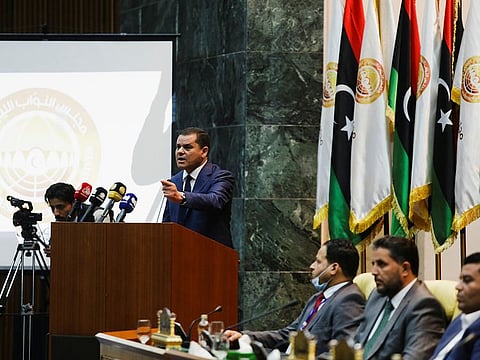Libya: PM urges 20,000 foreign fighters to leave
Mercenaries remain in country despite January 23 UN deadline for withdrawal

Abu Dhabi: Libya’s prime minister-designate demanded the departure Tuesday of an estimated 20,000 foreign fighters as he sought support from lawmakers to help end a grinding war in the North African nation.
“The mercenaries are a stab in our back — they must leave,” interim premier Abdul Hamid Dbeibeh told parliament, saying he would contact the United Nations and the countries where the mercenaries come from to demand they withdraw.
“Our sovereignty is violated by their presence,” he was speaking in the strategic city of Sirte, the gateway to Libya’s major oil fields and export terminals.
Libya has been split between the Government of National Accord (GNA), based in the capital and backed by Turkey, and an administration in the east supported by Libyan National Army (LNA) commander Khalifa Haftar.
Dbeibeh added on the second day of parliamentary debate on his proposal for a new interim government, where he denounced a “fierce campaign” carried out by “those who want to destroy our country, who want to occupy it”.
A UN-supervised process aims to unite the country after an October ceasefire between the two rival administrations.
But according to the UN, some 20,000 mercenaries and foreign fighters were still in Libya in early December, and a January 23 deadline for their withdrawal passed without any sign of them pulling them out.
An advance team of a UN observer mission arrived in Libya last week tasked with monitoring the ceasefire and verifying the departure of the thousands of foreign fighters.
Dbeibeh, who submitted his proposed government to parliament for approval last week, pleaded for deputies to vote in favor of it.
“We have no choice but to come to an agreement, for the future of our children,” he said, to the applause of parliament.
Dbeibeh was selected in February at UN-sponsored talks, attended by a cross section of Libyans, to steer the country towards December 24 elections.
The process has been marred by allegations of vote-buying, but the interim premier defended the composition of his proposed government.
“My first objective was to choose people with whom I would be able to work, no matter where they come from,” Dbeibeh said.
The members of his government “must be able to work for all Libyans in all of Libya, not just for their region or their city”, he insisted.
Over 130 of a total 188 lawmakers began meeting on Monday in Sirte to debate the proposed cabinet.
The United Nations Support Mission in Libya, or UNSMIL, called the meeting “historic” and praised the convening of a “reunified session after many years of divisions and paralysis”.
If approved, the interim government will face the daunting challenge of addressing the many grievances of Libyans, from a dire economic crisis and soaring unemployment to crippling inflation and wretched public services.
Dbeibeh’s proposed government includes two deputy prime ministers, 26 ministers and six ministers of state, with the key foreign and justice portfolios handed to women, a first in Libya.
He has until March 19 to win approval for his cabinet.
Last month, the UN Security Council urged all countries with foreign forces and mercenaries in the North African nation to withdraw them “without further delay”.
Security Council members called on all parties to implement the cease-fire agreement “in full,” to quickly withdraw foreign forces and mercenaries, and fully comply with the arms embargo.







